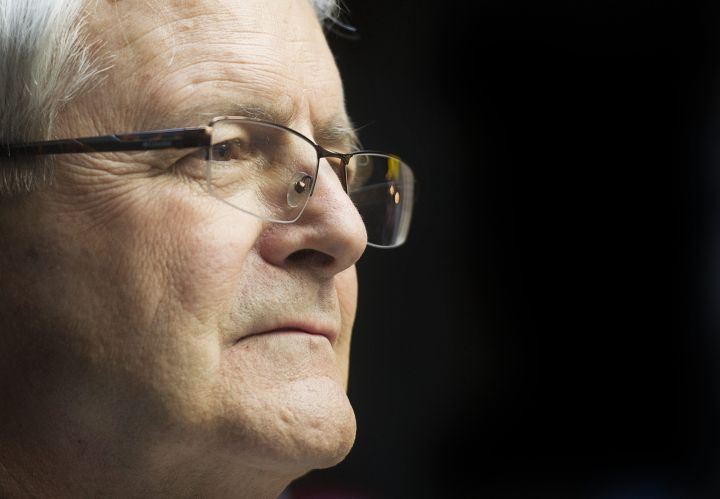Transport Minister Marc Garneau rolled into Alberta on Thursday to promote his bill that aims to help modernize Canada’s freight rail industry.

After getting his photograph taken near a grain elevator, Garneau told an Edmonton business luncheon that people cannot take for granted an industry that moves $280 billion worth of trade goods every year and is a backbone of the economy.
Garneau said the Transportation Modernization Act introduced this week would make the rail network more reliable, more competitive and better able to handle increased traffic. That would include greater movement of grain from a projected increase in crop production in coming years.
He noted the rail traffic bottleneck in Western Canada of 2013-14 when millions of tonnes of grain was left stranded in bins and on farm fields.
READ MORE: CN not to blame for grain backlog: president
“Our rail network’s ability to serve as a reliable supply chain partner has been affected by congestion,” he said.
“That becomes a more pressing concern when we look at forecasts saying that western grain production is expected to increase by almost 20 per cent in the next 10 years.”
Garneau said the legislation is designed to be fair to rail and shipping companies that need to attract investment to expand to meet growing demand for their services.
The proposal would require railways to provide data on rates, service and performance; allow some shippers to use a competing railway’s network; define the level of service that should be provided and allow shippers to seek financial penalties for poor performance.
The minister emphasized the need to provide better service to agricultural producers, especially in Western Canada.
“Grain farmers are the lifeblood of the Prairie economy,” he said. “Upwards of 60 per cent of their crops are destined for export markets. We are talking about more than $15 billion in sales.”
Garneau said he hopes the bill will pass this fall.
Agriculture groups have been lobbying hard for improvements for fear of a repeat of grain transportation delays. Some contend that producers have lost billions of dollars since 2013 due to a lack of rail and port capacity.
Farm groups say they are generally pleased with Garneau’s bill, but it remains to be seen if farmers would be better off.
Lynn Jacobson, president of the Alberta Federation of Agriculture, said producer groups are studying the legislation and will have more to say when they meet with Canada’s agriculture ministers this July in St. John’s, N.L.
Jacobson said it’s a good start and could go a long way toward preventing another grain shipment bottleneck.
“It could be the remedy.”
The Western Canadian Wheat Growers Association said the bill appears to include measures to improve service, but only time will tell.
Todd Lewis, president of the Agriculture Producers Association of Saskatchewan, said the legislation looks good, but farmers will keep pushing for change.
“We are all going to have to be vigilant to make sure that was is perceived to be being done is being done, and that it is beneficial to us.”
The Canadian Federation of Agriculture has called on the government to pass the legislation in time for farmers to benefit from the changes this year.
Canadian National (TSX:CNR) said it has been moving more regulated grain since the backlog, including an 11 per cent increase this year. Most has been covered by commercial agreements that include possible penalties.
CN spokesman Patrick Waldron said the company is reviewing the legislation and he suggested it could have unintended consequences “with respect to investment and will give U.S. railways access to the Canadian market at regulated rates – without reciprocity.”
Garneau said the government is aware of concerns about U.S railroads and the issue is covered in the legislation.



Comments